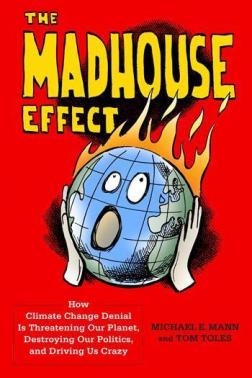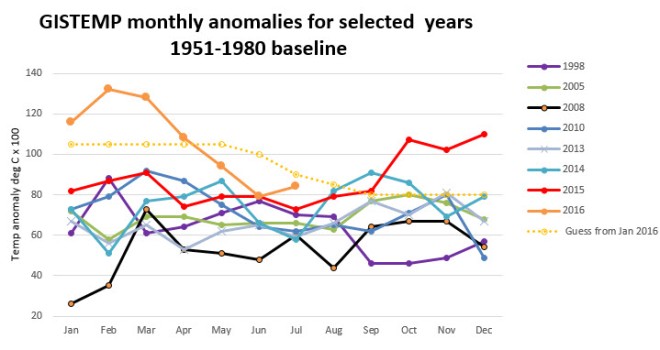Climate scientist Michael Mann has teamed up with cartoonist Tom Toles to write The Madhouse Effect: How Climate Change Is Threatening Our Planet, Destroying Our Politics and Driving Us Crazy. It’s an excellent book, well-written, authoritative on the science, revealing on the politics and laced with the wit of many superb cartoons. Buy a copy for the climate science doubter in your family. They will be drawn in by the cartoons and may well be unable to resist dipping in to the text.

Michael Mann has previously written The Hockey Stick and the Climate Wars: Dispatches from the Front Lines, about how he was hounded for writing a paper that featured the striking hockey-stick graph. He also authored Dire Predictions: Understanding Climate Change with scientist Lee Kump. At the same time that he turns out first-class books, Mann is a prolific research scientist and has an active presence on social media. You can only wonder how he does it all.
Tom Toles is a Pullitzer -Prize winning cartoonist who works for the Washington Post. His main focus is politics, but his cartoons have often featured climate science and the absurd lengths that many American politicians go to in avoiding the facing up to the reality of global change.
Writing about scientific subjects like climate change for the non-specialist is not easy and authors have to walk a fine line. Many readers expect scientists to be detached about the implications of their work, but that would make their message less engaging, less human. The science needs to be explained in ways that the average person can understand, but oversimplification can gloss over some of the important complications. And treatments of the topic can so so easily be depressing and dull. The Mann/Toles team have succeeded in bringing their talents together to overcome these problems. The writing is excellent and the cartoons add a much-needed satirical perspective.

One small shortcoming of the book, at least for non-American readers, is the focus on US politics. But, then again, the leadership of the US—the world’s largest economy and second-largest emitter—is indispensable when it comes to solving the climate crisis. Anyone who cares about the future of the planet has to pay close attention to the goings-on in the madhouse that has become the home of much of the US political right. Non-Americans can only watch what is going on there in fascinated and impotent horror. At least US citizens get to vote.
Despite all of the political lunacy and the dire consequences that will unfold if we don’t take action, Mann and Toles offer an informative, entertaining and, crucially, hopeful review of the science, politics and solutions to the climate crisis. There are signs that the politics of denial have reached a tipping point—reality is finally asserting itself against wishful thinking. All of the world’s nations took a vital first step in Paris in December 2015. Costs of key technologies like solar and wind power, energy storage and electrical vehicles are falling and show no signs of levelling off. There’s no reason to despair. Besides, that never was an option.

